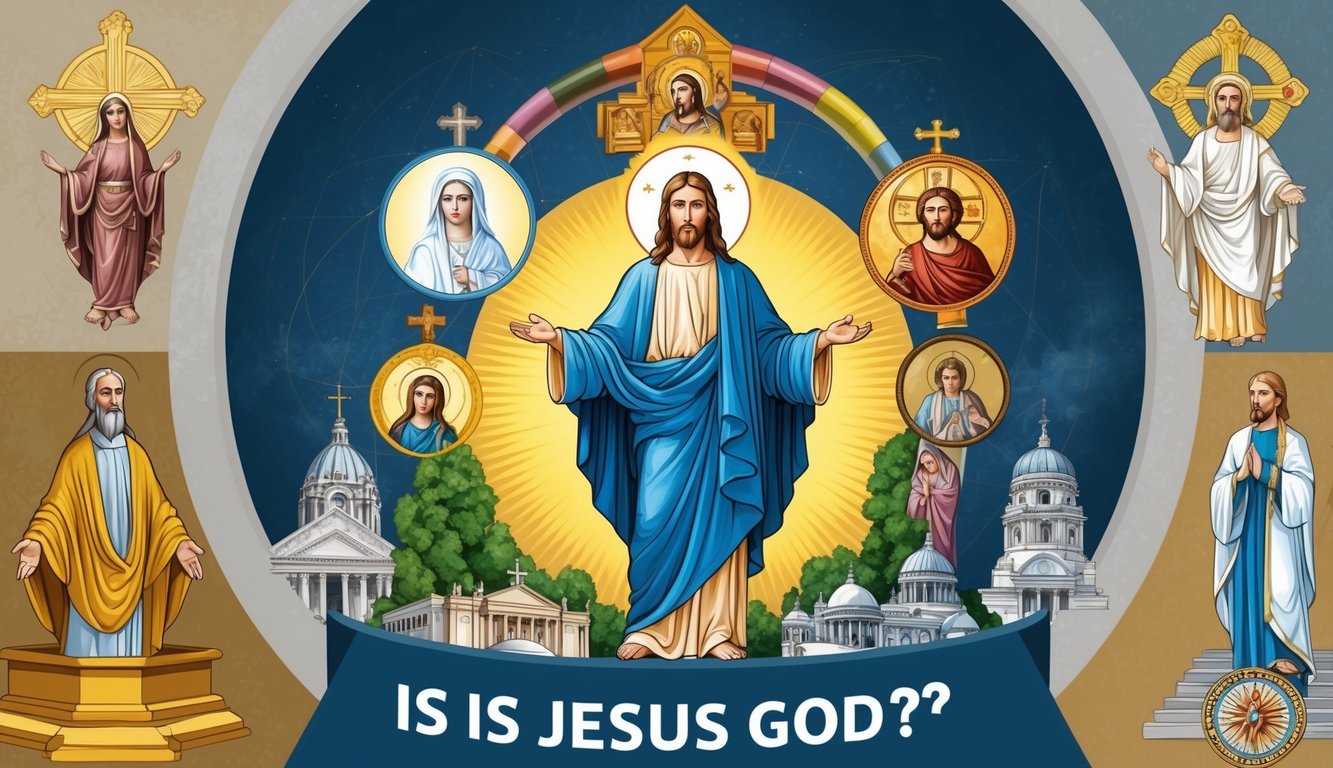Don’t Miss Out On This Unique Astrological Opportunity
Are you tired of spinning your wheels and getting nowhere? Simply put, you’re out of sync: you’re out of alignment with your astral configuration.
But: there’s a kind of map that can help you reclaim your alignment. Think of it as your own personal blueprint to success and happiness: a blueprint that will help you live your most amazing life.
Get started here.
Many people have asked if Jesus is God, and this question has sparked discussions in Christian teachings for centuries. Central to Christianity is the belief that Jesus is both fully divine and fully human. This belief is rooted in various passages in the Bible, like John 1:1, which refers to Jesus as the “Word” who was with God and was God.
The idea of Jesus being God is tied closely to the concept of the Trinity.
This means that Jesus is part of the three-person nature of God, including the Father and the Holy Spirit.
This perspective sees Jesus as eternal and part of God’s plan to reveal Himself to humanity.
While some see Jesus as simply a wise teacher or a prophet, Christians often see Him as Lord and Savior.
This view is considerably shaped by His teachings, life, and the belief in His resurrection.
As you explore this topic, you’ll find that understanding Jesus’ role and identity can offer deeper insights into Christianity and its impact on the world.
Key Takeaways
- Jesus is central to Christianity as both divine and human.
- Belief in Jesus as God is integral to Christian understanding.
- Views about Jesus vary widely, impacting cultural and historical contexts.
Historical Context and The Gospels

In this section, you’ll explore key aspects of Jesus’ life within the context of the Gospels, including his teachings, family background, and the events surrounding his crucifixion and resurrection.
These elements provide insight into how Jesus is portrayed in the New Testament and how his legacy has impacted Christianity.
Life and Teachings of Jesus
Jesus of Nazareth is a central figure in Christianity, often described as a Galilean who traveled and preached throughout the region.
His teachings are captured in the canonical gospels, including the Gospel of Luke.
Key elements of his ministry include the Sermon on the Mount and numerous parables that convey moral and spiritual lessons.
These teachings highlight themes of love, forgiveness, and humility.
Jesus often used simple stories to explain profound truths, which made his ideas accessible to many.
His teachings attracted a following and have been discussed and studied through centuries.
Understanding these teachings sheds light on why he is seen as both a spiritual leader and a revolutionary figure.
Jesus: The Son of Mary and Joseph
Jesus was born in Bethlehem, growing up in Nazareth as the son of Mary and Joseph.
The New Testament describes Mary as a virgin, emphasizing the miraculous nature of Jesus’ birth.
Joseph, a carpenter by trade, provided for the family.
This family background set Jesus apart, as stories of his miraculous birth became an essential part of his identity.
Despite humble beginnings, his life was marked by events that underscored his connection to divine prophecy, which can be contrasted with narratives from the Old Testament.
Understanding his familial roots helps explain why the message he spread was revolutionary at the time.
Crucifixion and Resurrection
The crucifixion and resurrection of Jesus are pivotal events in Christian theology.
According to the Gospels, at Passover, Jesus had his Last Supper with the disciples in Jerusalem, which Christians commemorate as a significant event.
His crucifixion on the cross, a punishment by the Roman authorities, marked the culmination of his earthly life.
Followers believed his resurrection three days later affirmed his divine nature.
These events not only underscore themes of sacrifice and redemption but also define Christian belief in life after death.
Understanding these events helps frame Jesus’ lasting impact and influence within the Christian faith.
Theological Significance
In Christian theology, understanding Jesus’s nature and role is crucial.
Here, we explore how Jesus is viewed as both fully divine and fully human.
We also look at the implications of these beliefs on salvation and how Christology has evolved.
Jesus’s Divinity and Humanity
In Christianity, Jesus holds a unique position as both the Son of God and the Son of Man.
This means he is understood to be fully divine and fully human.
This concept, known as the Incarnation, is vital in Christian faith because it shows how Jesus bridges the gap between God and humanity.
The idea of the Holy Trinity supports his divine nature.
Jesus is part of the Trinity, which includes God the Father and the Holy Spirit.
His divine and human natures come together to fulfill God’s purpose in the world.
Salvation and Atonement
Salvation in Christian theology relies heavily on Jesus’s divine nature.
Believers hold that his death was essential for the atonement of human sins.
If Jesus were not divine, his sacrifice wouldn’t be sufficient to pay for the sins of the world.
Jesus’s sacrifice is seen as a way to reconcile humanity with God.
Christians believe this is the reason why salvation is possible for all who accept Jesus as their savior.
This act of atonement allows for a personal relationship with God, offering individuals a path to redemption and eternal life.
Developments in Christology
Over time, the study of Christology has focused on understanding Jesus’s nature and role.
Early church debates focused on whether Jesus was truly God, truly human, or both.
These discussions led to the development of doctrines about the Trinity and Jesus’s dual nature.
Understanding Jesus as both God and man has shaped Christian teachings about the significance of his life, death, and resurrection.
These ideas continue to evolve, but the core belief in his dual nature remains central to Christian theology.
Jesus in Different Perspectives
Many religious traditions view Jesus in unique ways.
Each perspective highlights different aspects of who Jesus is, especially within the contexts of Judaism and Islam.
Understanding these views helps grasp the varied roles Jesus plays across beliefs.
Jewish Recognition of Jesus
In Judaism, Jesus is typically not recognized as the Messiah.
Jewish tradition holds that the awaited Messiah has yet to come.
They expect a leader descended from King David who will bring peace and rebuild the Jewish temple.
Jewish views often regard Jesus as a historical person but not divine.
The Gospels of Matthew, Mark, Luke, and John focus on Jesus’s life, yet Jewish interpretations differ significantly from those of the Christian faith.
Jesus in Islam
In Islam, Jesus is considered a prophet and is deeply respected.
Muslims call him Isa and view him as an important messenger sent by God.
He is seen as a miracle worker and was born to the Virgin Mary, emphasizing his significance.
Though not viewed as divine or the son of God, Islam acknowledges that he brought God’s word.
This aligns somewhat with Islamic teachings that echo parts of Jesus’s life seen in the Bible’s accounts.
Comparative Analysis
Across different faiths, Jesus’s role can significantly vary. Christianity sees him as both God and the Son of God, central to salvation.
In contrast, Judaism does not attribute any divine nature to Jesus. Islam, while recognizing him as a prophet, does not consider him part of a Trinity or divine trio.
Each religion has its own sacred texts and traditions influencing these views.
This divergence shows that the figure of Jesus can be both unifying and distinct based on religious perspectives.
Historical and Cultural Influence

When exploring Jesus’s role as God, it’s important to examine how his image and teachings have shaped art and society.
Jesus has been an integral figure in religious art and has influenced societal norms and values through centuries.
Artistic Depictions and Worship
Throughout history, Jesus has been a central figure in art.
Artists like Leonardo da Vinci and Michelangelo have created famous works that depict Jesus’s image, reflecting both worship and divine admiration.
Paintings, sculptures, and stained glass often portray scenes from his life, seen in events like the Last Supper or the Crucifixion.
These artistic expressions not only illustrate Bible stories but also serve as evidence of Jesus’s significance.
They showcase how important he is to many, particularly within the Christian Church.
Worship through art has been a way to connect with the divine, making abstract beliefs tangible and real.
The Impact on Society
The teachings of Jesus have left a profound impact on society, influencing laws, values, and traditions.
With principles like love and forgiveness, his teachings shaped moral codes and social behavior.
In the Acts of the Apostles, you see how the early disciples and apostles spread these values, transforming communities.
Works by scholars like Philip Schaff and Josh McDowell discuss the historical reliability of these accounts, emphasizing the enduring influence on Western civilization.
The Christian Church has been instrumental in this spread, promoting education, charity, and unity.
Jesus’s teachings continue to resonate, affecting daily life and societal norms across the world.
Frequently Asked Questions

This section explores various views on Jesus’s nature and identity.
From biblical interpretations to theological discussions, these questions address how people understand Jesus’s divine connection.
Some see Him as the Son of God and Savior, while others view Him as a profound moral teacher.
The Bible description of Jesus highlights His compassion, wisdom, and divine authority, shaping Christian beliefs for centuries.
These differing perspectives influence religious traditions and personal faith worldwide.
Does the Bible explicitly state that Jesus is God?
The Bible contains verses that affirm Jesus as divine, such as John 1:1 and Colossians 2:9.
Some Christians believe these scriptures prove Jesus is God, while others see them as supportive hints of His divine nature.
How is the identity of Jesus perceived differently in Christianity and Islam?
In Christianity, Jesus is regarded as both God and the Son of God.
In contrast, Islam sees Him as a prophet but not divine.
This difference shapes how each faith understands Jesus’s role and significance.
What distinguishes Jesus from God in theological discussions?
Theological discussions highlight the concept of the Trinity, where Jesus is one part of the three-in-one nature of God.
Jesus and God the Father are distinct but share the same divine essence according to this belief.
In what ways do people interpret the relationship between Jesus and God?
Some interpret Jesus as God incarnate, while others emphasize His role as God’s Son.
These interpretations can affect how individuals view His divinity and relationship with God the Father.
Can Jesus be considered God in human form according to biblical scripture?
Many Christians believe that Jesus was God in human form, as supported by passages like John 1:14.
This belief is central to the understanding of Jesus’s life and mission on Earth.
How does the Catholic Church view the divinity of Jesus?
The Catholic Church teaches that Jesus is fully God and fully human.
This belief forms a core part of Catholic faith and is reflected in church teachings and traditions.



